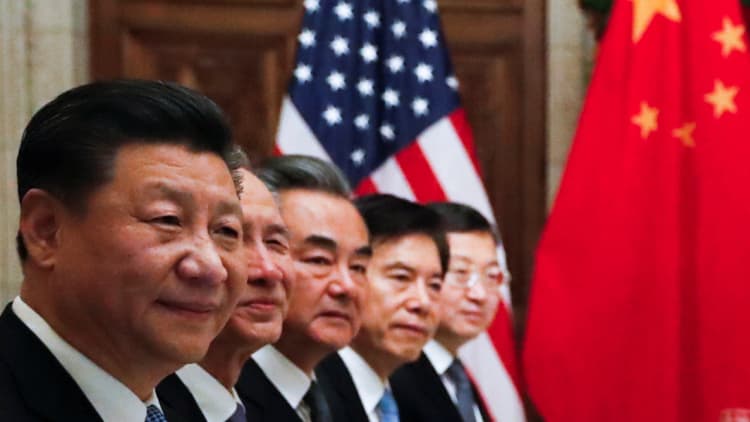
It's been just three days since President Donald Trump announced that U.S.-China relations had taken a "big leap forward" after an "extraordinary" three hour meeting in Buenos Aires.
But in that time, a steady stream of vague and conflicting messages from White House economic advisers has tamped down early optimism among U.S. investors that what happened in Argentina represented a breakthrough in U.S. trade relations with its largest trading partner.
As the Dow plunged nearly 800 points on Tuesday, driven largely by a sell-off in bank stocks and signs in the bond market of a looming economic slowdown, the White House appeared helpless to staunch the bleeding.
With no clear message or discernible strategy from the president on the China trade talks, what had seemed just a few days ago like it could be a shot in the arm to the U.S. economy, by Tuesday only added to the grim uncertainty facing investors.
In a break from the usual protocol for top-level trade talks, the U.S. and China did not release a joint statement following Saturday's meeting, leaving observers to interpret for themselves what the talks accomplished based on two very different readouts.

According to the Trump White House, China agreed to "immediately" begin buying more U.S. agricultural products. The two countries also agreed, the White House said, to a 90-day timeframe for negotiations on major issues like intellectual property theft and forced technology transfer. Trump also tweeted on Saturday that China had agreed to eliminate its automobile tariffs on U.S. cars, which it recently raised to 40 percent in retaliation for U.S. tariffs on Chinese goods.
But Beijing's readout reportedly did not mention China agreeing to any of these provisions. And a foreign ministry spokesman would not even confirm the most basic parameters of the talks, namely, that the truce would last for 90 days.
"We agreed to hold off on imposing new tariffs. This agreement is quite significant since it has stopped our trade dispute from escalating and also opens up new prospects for win-win cooperation," Chinese foreign ministry spokesman Geng Shuang told reporters on Monday.
Asked specifically about whether a 90 day timeframe had been agreed to for the truce, Shuang dodged the question. "I think you should focus on that we discussed and agreed," he said.
While details about the talks were hard to come by in Beijing, details coming out of Washington were downright confusing. A White House spokesman did not immediately respond to questions about the administration's messaging.
Start of the truce
On Monday, Larry Kudlow, director of the National Economic Council, told reporters in a briefing call that the 90 day truce on tariff increases would begin January 1, the same day that those proposed increases were set to go into effect. But six hours later, the White House said Kudlow was wrong; the clock had started ticking on December 1, the night of Trump's meeting with Chinese President Xi Jinping.
There also appeared to be confusion among Trump's top advisers about exactly who would lead the negotiations. U.S. Trade Representative Robert Lighthizer, who is more of a protectionist, appeared to be set to play that role. But Treasury Secretary Steven Mnuchin told CNBC Monday, "it's clear that President Trump is going to be the one who leads the negotiations, and the team will be an inclusive team." Trump later confirmed that Lighthizer would lead the team.
China has more clarity in that regard. Vice Premier Liu He has headed negotiations for Beijing during the Trump administration.
As for Trump's tweet about the auto tariff agreement, neither Kudlow nor Treasury Secretary Steve Mnuchin nor trade adviser Peter Navarro would confirm that Beijing had agreed to eliminate automobile tariffs on U.S. cars, as Trump had claimed.
"In my view, I think the president expects them to go to zero," Kudlow said Monday on Fox News, when pressed about the auto tariffs. That same day, Navarro told NPR that the auto tariffs were "just one of the many tariffs that have to be reduced."
Mnuchin told Fox Business on Tuesday that China had made "specific commitments in the near-term on agriculture, LNG, industrial products, autos...with specific targets that they think they can meet."
U.S. officials like Mnuchin and Kudlow also emphasized that nothing had been put down on paper yet, and they gave no solid time frames for when investors could hope to see concrete agreements. Instead, they repeatedly used the word "immediately" to describe when they expected the next steps in the talks to take place.
But Navarro, who is one of the administration's top China hawks, put it more starkly. "We've just given the Chinese 90 days to do what they should have been doing for the last 20 years." he told NPR.
Trump's changing tune
Yet of all the Trump officials who seemed to give conflicting messages about the details of the trade truce, none of them changed their tune as much as Trump himself appeared to, between Saturday and Tuesday. In addition to his auto tariff tweet, Trump also announced at the conclusion of the meeting that the "deal" reached with China meant immediate increases in Chinese purchases of U.S. agricultural products.
"Farmers will be a very BIG and FAST beneficiary of our deal with China," Trump wrote on Twitter Saturday. "They intend to start purchasing agricultural product immediately. We make the finest and cleanest product in the World, and that is what China wants. Farmers, I LOVE YOU!"
Three days later, on Tuesday morning, there was no mention of a "deal" that had been reached. Instead, Trump tweeted that his advisers would work "on seeing whether or not a REAL deal with China is actually possible."
"President Xi and I want this deal to happen, and it probably will," he wrote. "But if not remember,......I am a Tariff Man."


